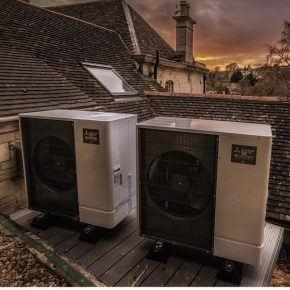
GUEST ARTICLE: Revolutionising Energy Efficiency in the UK
 Last week, Rishi Sunak announced a ‘more pragmatic, proportionate response’ to Net Zero targets, taking a U-turn on key green policies on boilers and home energy efficiency upgrades and even dismantling the Energy Efficiency Taskforce. This is a major step-back, not only towards achieving the UK’s commitment to net zero emissions by 2050 but also with regards to protecting people’s health and wellbeing, according to Nicolas Gillanders, CEO, South Coast Insulation Services (SCIS)…
Last week, Rishi Sunak announced a ‘more pragmatic, proportionate response’ to Net Zero targets, taking a U-turn on key green policies on boilers and home energy efficiency upgrades and even dismantling the Energy Efficiency Taskforce. This is a major step-back, not only towards achieving the UK’s commitment to net zero emissions by 2050 but also with regards to protecting people’s health and wellbeing, according to Nicolas Gillanders, CEO, South Coast Insulation Services (SCIS)…
Upgrading the energy efficiency of UK homes can go a long way in the battle to reduce carbon emissions, cut on energy bills and improve occupant health. But the UK’s energy efficiency policies are holding us back. It is even more obvious that we are lagging behind when looking at the progress made by other countries across Europe like France and Germany. The UK needs a kick up the backside when it comes to its approach to energy efficiency – and it is policy that can provide this drive.
Looking forward: three key considerations for change
So, what could an effective approach to policy look like? Success will depend on the combination of learning from the past mistakes made in the implementation of regulations and being able to seize the opportunities in the industry.
Firstly, green mortgages offer a significant opportunity for consumers to access energy efficient upgrades affordably. Thanks to zero percent interest options, homeowners can afford energy-efficient upgrades, and ultimately make drastic savings.
The benefits can also include raising property value, reinforcing the case for green mortgages as high-return investment. This goes to show the role that policy can play in the implementation of energy efficiency solutions.
Secondly, the industry must take a data-driven approach to effectively guide performance. Quantitative data can play a pivotal role in shaping informed policy decisions. For example, SCIS advocate for the public availability of smart metre data.
With millions of smart metres now installed in the UK, this provides an opportunity for millions of data sets to be leveraged to help the energy efficiency industry to target properties in most need of support.
Lastly, the government must cooperate with the industry to establish clear and inclusive policies, informed by insights from those actively addressing practical challenges on the front lines. On top of leveraging data intelligently, the end-to-end retrofitting and energy efficiency installation journey must seamlessly connect assessors, brokers/lenders, installers and consumers, if the UK is to catalyse change effectively.
All stakeholders have a role to play, and I would encourage all industry players to demand a seat at the table, to ensure that policies are not only realistic but also reflect collective goals to help consumers create more cost and energy-efficient homes.
Final Thoughts
Without doubt, Sunak’s rework of green policies presents an additional challenge for the energy efficiency industry. Yet there is also an opportunity for us all to stick together for a better, greener future. And the first step to having accessible policies is to make ourselves heard by the government, and keep working for the benefits of consumers and the planet.
Latest news

4th March 2025
S. Norton Group showcases £20m shredder for metals recycling CEOs
S. Norton Group hosted a tour of its latest £20m investment in state-of-the-art shredder technology for 17 senior leaders in the European metals recycling industry.
Posted in Articles, Building Industry News, Building Products & Structures, Building Services, Case Studies, Facility Management & Building Services, Plant, Equipment and Hire, Posts, Site Preparation, Sustainability & Energy Efficiency, Waste Management & Recycling
28th February 2025
Passivent ventilation solutions are top of the class
Passivent has supplied a combination of Hybrid Plus2 Aircool ventilators and Hybrid Plus Airstract roof ventilation terminals for a new London primary school.
Posted in Air Conditioning, Articles, Building Industry News, Building Products & Structures, Building Services, Case Studies, Ceilings, Facility Management & Building Services, Heating, Ventilation and Air Conditioning - HVAC, Restoration & Refurbishment, Retrofit & Renovation, Roofs, Sustainability & Energy Efficiency, Ventilation, Walls
28th February 2025
Troldtekt: New acoustic liner ensures good acoustics and easy handling
Both a building’s users and its developers have a good reason to get excited about the new Troldtekt Plus 25 panels. This specially developed acoustic panel sets a high standard for both sound absorption and building efficiency.
Posted in Acoustics, Noise & Vibration Control, Articles, Building Industry News, Building Products & Structures, Building Services, Building Systems, Ceilings, Facility Management & Building Services, Floors, Innovations & New Products, Insulation, Interior Design & Construction, Interiors, Restoration & Refurbishment, Retrofit & Renovation, Timber Buildings and Timber Products, Walls
28th February 2025
InstallerSHOW 2025 – Registration is now OPEN!
Building on the success of last year, InstallerSHOW is returning to the NEC from the 24th to the 26th of June…
Posted in Articles, Building Industry Events, Building Industry News, Building Products & Structures, Building Services, Exhibitions and Conferences, Health & Safety, Retrofit & Renovation, Seminars, Sustainability & Energy Efficiency
 Sign up:
Sign up: